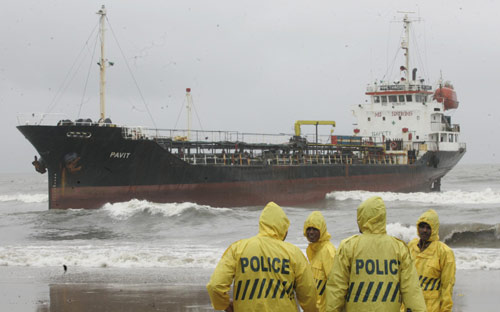Ghost ship sinks India's coastal defences claims
m.v. Pavit drifted undetected for over 100 hours to Mumbai's shores
Children play near m.v. Pavit, a Panama-flagged vessel that ran aground on the Juhu beach
India's post-26/11 coastal defences have been brutally exposed by Pavit, a 1,000-tonne Panama-flagged merchant vessel, which ran aground on Mumbai's Juhu shore on Sunday, undetected by the new, three-tier security ring on which at least Rs. 700 million has been spent.
The ship, which was abandoned by its crew last month and reported sunk, drifted for more than a hundred hours through India's maritime territory before being detected late on Sunday afternoon.
The Navy, responsible for security beyond 12 nautical miles; the Coast Guard, which patrols the zone between 5 and 12 nautical miles; and the newly created maritime police, all failed to detect it.
There was no official word, though, on who was responsible for the failure — the second in recent weeks of an abandoned ship being washed up here.
In October 2010, Union Home Minister P. Chidambaram said India had made "significant progress" in improving its coastal defences since 26/11. In particular, he pointed to the setting up of control rooms to coordinate patrolling by the Navy, the Coast Guard and the maritime police.
Alarmed by a series of pirate attacks on maritime traffic off India's shores, Defence Minister A.K. Antony said in January this year that coastal security was on the government's "immediate agenda."
Satish Agnihotri, Director-General of Shipping, said inquiries were needed to establish "for nearly 100 hours when the ship was in Indian waters why the detection did not happen." He refused comment, though, on who might have been responsible, saying it would not "be appropriate on my part to talk about the sister agencies."
Long-standing fears
Long-standing fears that terrorists could exploit gaps in India's coastal defences were underlined on 26/11, when a 10-man Lashkar-e-Taiba assault team sailed undetected into the city on a hijacked fishing boat. Experts have since warned that terrorists could also load ships with explosives, or even biological and chemical weapons.
In its report for 2010-2011, the Ministry of Home Affairs records that 183 interceptor boats had been provided to Gujarat, Maharashtra, Goa, Karnataka, Kerala, Lakshadweep and Daman and Diu since April 2009. These States and Union Territories, the report says, have also benefited from Rs. 4 billion spent on 73 coastal police stations, 97 checkpoints and 58 barracks, as well as an annual grant of Rs. 1.51 billion for their operation. In addition, the Ministry of Home Affairs gave Rs. 627.75 million to the Ministry of Defence for 15 additional Coast Guard patrol ships with specialised capabilities.
Sources in the State government said Maharashtra had so far received 40 patrol boats and was waiting for the delivery of 17 more. The boats were, however, not in use because of the monsoon, the sources said. Police sources said the boats, delivered to an accelerated timetable, also suffered chronic mechanical failures, and trained crew were in short supply.
Sources in the police and the Coast Guard said the boats would be of limited use until India's fishing boats were fitted with specialised transponders, which would allow unidentified and potentially hostile vessels to be intercepted with precision.
Highly placed defence sources, however, said the trial of the three systems —satellite-based tracking, Very High Frequency and Automatic Identification System — were just beginning, and would take over a year to complete.
Global concern
Ever since 9/11, governments across the world have invested billions of dollars in port security, fearing that hijacked or unmanned ships could be used to transport weapons of mass destruction or lethal quantities of conventional explosives into urban concentrations.
The accidental detonation of 1,400 tonnes of explosives stored on SS Fort Stikine, a 7,142-gross tonne freighter, killed at least 740 people and injured more than 1,800 at Mumbai's port in 1944.
In a paper published in the South Asia Intelligence Review, maritime security expert Vijay Sakhuja recorded that India's port authorities were "conscious of scenarios such as a fully loaded tanker exploding in harbours, explosives in containers, ship hijacking and terrorists as stowaways." However, he said, they were "constrained by the lack of adequate security personnel and equipment."
A senior official of the Home Department admitted that ships coming to the shores of Mumbai did pose a security hazard, and he would convene a meeting between the Navy and the Coast Guard shortly to discuss the issue.
The Hindu : News / National : Ghost ship sinks India's coastal defences claims




